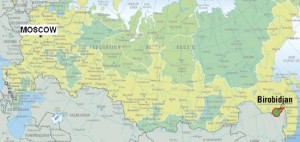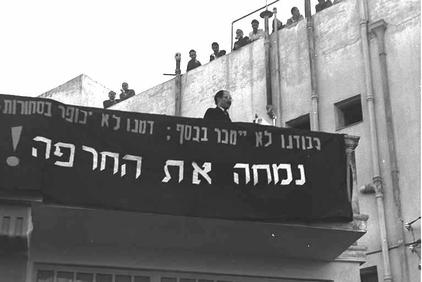
It is certainly one of the oddest twists in history that the Soviet Union created in effect a Jewish state for the Jews before the state of Israel.
For a short period of time toward the end of the First World War the Ukraine was an independent country. It happened when Imperial Germany made peace with Czarist Russia and the terms included making the Ukraine independent. The head of the country was a Cossack. However, a civil war between Communist Russians (the Red army) and anti-Bolshevik Russians (the White army) raged for four years between 1917 and 1921. When the Red army finally defeated the White army they ended the Ukrainian Republic, which had many Jews.
The Russians attempted to mollify the Jews by establishing an autonomous, independent Jewish republic. Their real goal was to drain off the Zionist movement of Jews.
Menachem Begin told the story about the time he was imprisoned in the Soviet Union and was interrogated by a Jewish member of the NKVD.
“Why are you so against us?” Begin, already a well-known Zionist-Revisionist, asked his interrogator.

In one of the most telling insights, he responded, “Because you steal from us those young men who would make the best Communists. Zionism holds back the dawn of the future.” (Menachem Begin discusses this and other things in his short memoir called, White Knights.)
The communists feared that Zionism would steal the revolutionary thunder from the communists. Therefore, they thought that by creating a Jewish state anywhere other than Palestine they would solve their Jewish problem. The state or republic they created was set up in a God-forsaken area of the Soviet empire near the Caucuses called Birobidzhan.
The Bolsheviks banned Hebrew as a language but allowed Yiddish to continue as a language and subculture. The proposed Jewish homeland, the “paradise” of Stalin’s nightmare plans for his Jewish subjects in Birobidzhan, had Yiddish as its official language. However it was a phonetic Yiddish purged of its Hebrew origins, spellings and nuances and its biblical and Talmudic references.
The attempt to make Yiddish and its language and culture the basis for vibrant Jewish life and continuity failed completely. Despite Soviet efforts, at its height the Jewish population of Birobidzhan was never more than 20% of the overall population.
It was supposed to be the prime example of the success of the Communist Revolution. But Jews did not want to go there. In the final analysis, Birobidzhan was abject failure and became a matter of derision.











